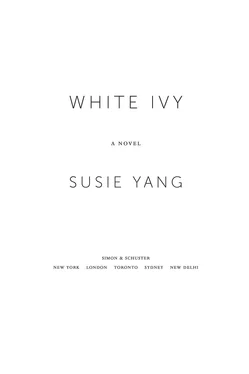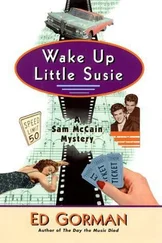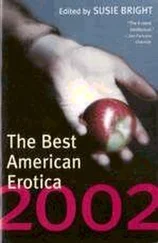5
THE FIRST THING THAT HIT Ivy was the smell: a dank airless cocktail of sweat, oil, boiled cabbage, which within seconds, like sawdust, clung to her clothes and hair so that when she lifted her ponytail from the nape of her neck, it seemed the odor was reeking from her own pores. Shen’s cousin Sunrin Zhao was supposed to pick her up from baggage claim. It occurred to Ivy she had no idea what Sunrin Zhao looked like. The crowd was one homogenous entity of crow-haired people scurrying like beetles among rope-wrapped suitcases, making it impossible for Ivy to distinguish any one face from another. She looked toward the line of portly men sweating profusely in their black suits, holding white placards with their visitor’s name, and scanned for her Chinese name: Lin Jiyuan. Someone called out, “Ivy!”
Ivy turned. Walking toward her was a tall woman in all white: white polo, white khakis, white strappy sandals, and enormous white-framed sunglasses studded with crystals perched on a rather long nose. “You’re all grown up now,” she said in perfect English through bright red lips, drawn in the shape of a strawberry. With her sleek hair set in waves on the sides of her ears, she looked like one of those old Hollywood starlets Liza Johnson and the twins had taped photos of inside their lockers.
“How’d you know it was me?” Ivy asked.
“Shen sent me your photo. Also—look at you. Even the shopgirls can tell the ABCs from locals. You must be careful because they’ll try to take advantage.” Sunrin took off her sunglasses. Her eyes crinkled into half-crescents. “You don’t look a bit like Shen though. What big eyes you have! You look like your mother when she was young.”
She told Ivy to call her Sunrin, asked after Ivy’s flight, the Lins’ health, apologized for the terrible heat. As she talked, she led Ivy to the parking lot, where a valet pulled up in a gray Mercedes, the car’s compact curves resembling a blown-up version of the toy cars Austin used to play with. The valet handed Sunrin the keys, muttering something about imported cars, to which Sunrin replied affably, “German.”
Sunrin drove like a man, fast, impatient, squeezing into nonexistent lanes between dusty cars and scooters crammed four to a seat, her manicured hands on the leather steering wheel painted the plump red-orange of a grapefruit. She played a tape of folk music she said she’d bought from a street performer in Dublin during her student days. The lively sounds of the violin and flutes made Ivy think of ruddy-cheeked peasant girls in starched plaid smocks and little brown moccasins, an absurd contrast to the gray smoggy highway around them, as they passed one rickety bus after another, the windows blackened by grime like the face of a woman with mascara streaking down muddy cheeks.
“Oh, before I forget—I have a present for you.” Sunrin reached into the backseat and handed Ivy a gift bag, much like the one Ivy had given Gideon on his birthday, from which Ivy pulled out a velvety pink box that felt like the skin of a peach.
“My kids love these,” said Sunrin. “They’re Japanese chocolates. Try one. If you like them, we can pick up some more in Hong Kong. They don’t sell them on the mainland.”
Ivy took off the lid. Each piece of chocolate was wrapped in pink tinfoil. She bit into one. Even the filling was pastel pink. For Valentine’s Day in the seventh grade, Gideon had brought to class two dozen of Mrs. Speyer’s famous strawberries-and-cream cupcakes; when Ivy had eaten hers to the base, she’d discovered a dark-chocolate truffle, warm and molten, nestled in the center. Sunrin’s chocolate had the same taste. It tasted like money.
Sunrin lived in a gated neighborhood guarded by two dark-skinned men in camo jackets, polished brown boots, green army caps. As soon as the gates closed, the city’s smoggy streets disappeared and silence descended like a thick blanket upon the cobbled streets and terra-cotta homes. Sunrin’s husband greeted Ivy at the door with a limpid handshake. He was a squat, jolly man with a double chin and thin hair brushed over his forehead. The two children—a boy and a girl, four and two, both of them with Uncle Wang’s pudgy limbs and Sunrin’s crinkly eyes—were ushered forth to greet their American cousin. The girl hid behind her mother’s legs but the boy dashed around swinging a plastic saber. The relentless blade struck the sofa, table, chairs, the plants, ending with an emphatic thrust at a helpless orchid, causing its stem to curve tragically over the rim of the vase like a fallen swan. Ivy trembled with fear for the little boy’s retribution. But Sunrin only frowned and called out for the children’s ayi , an old woman of around Meifeng’s age who had just come out of the kitchen carrying a platter of boiled noodles. The ayi placed the noodles on the table and hurried over to bring the children upstairs. “Our Lei Lei has too much energy,” said Sunrin. “He’s worn out his last three nannies. And one of them was only in her forties.”
“Now, now,” said Uncle Wang fondly. “Don’t speak about our little Lei Lei that way.”
Sunrin led them to the table. Next to the platter of steaming noodles were the condiments: black vinegar, soy sauce, minced garlic, chopped scallion, slivers of ginger, hot pepper oil, peanut sauce, sesame oil, and a beige powder Uncle Wang said was MSG. As they ate, Sunrin described the two-week travel itinerary she had planned: after their historical tour of the Forbidden City and Great Wall in Beijing, they’d take it easy in Shanghai. Dine at a famous duck restaurant in Old Town, attend a jazz performance on Hengshan Road Bar Street, take in the waterfront scenery at the Bund; they’d end their trip in the international malls of Hong Kong with their European-crafted clothes and Japanese cosmetics. “Which skincare brand do you use?” Sunrin asked.
Fingering the dry patch on her cheek, Ivy said self-consciously, “I don’t really use anything.”
Sunrin’s eyes went so perfectly circular she looked like one of those Russian nesting dolls. “But you must! A girl’s most important beauty area is her skin.” She began listing all the different products they would need to buy for Ivy’s new skincare regimen. “We’ll get the basics first, then go from there. Do you like makeup?”
Did she like makeup! What else was there to say? “I love makeup.”
Her fairy godmother had finally arrived.
UNCLE WANG ELECTED to stay behind in Chongqing, he was the head of a Korean-Chinese investment company and was organizing a golf tournament with foreign associates. When Ivy thanked her aunt for taking time off work to host her, Sunrin laughed—she seemed to laugh at everything—and said she’d quit her job when Lei Lei had been born. The ayi accompanied them on the trip as well. Her job was to keep Sunrin’s two children fed and entertained as Ivy and Sunrin strolled ahead down the streets of Beijing, slurping sheep’s milk yogurt in glass bottles, or checking into their various historically preserved, five-star hotels. Ivy pretended that Sunrin was her mother, and they were on a mother-daughter bonding vacation, while her father, a business tycoon, stayed at home to run his company. Now, now , she whispered as she brushed out her bangs in front of the vanity mirror. Don’t speak about our little Ivy that way. She glowed in pleasure when the concierge complimented Sunrin on raising such a pretty daughter.
Sunrin was always very polite to the servicepeople, saying please and thank you , though it wasn’t the normal Chinese custom to use such formalities. Despite her placidity, she managed to convey a sense of authority that made everyone from waiters to bellboys rush around in circles trying to please her. Once, when their taxi driver heard them conversing in English, he claimed his rate was double what they had agreed upon, he wasn’t going to drive them to their destination, stuck in traffic no less, for pennies. Sunrin said, “Let us off here at the curb then.” When he didn’t oblige, mumbling under his breath about getting cheated, she said, “I mean it. Let us off.” They were on a two-lane highway, somewhere in Beijing’s second ring, on their way to see the Tanzhe Temple. Around them, cars whizzed by irrespective of lanes, going a hundred kilometers an hour, honking at the motorbikes swerving around them as thick as flies.
Читать дальше












